If you’ve worried that your toothbrush, being usually in the same room as your toilet, is perpetually covered in microscopic fecal matter, well, here’s some relief. According to a new study, our brushes are full of bacteria found in our mouths, but they’re not full of bacteria from our guts. In other words, our toothbrushes don’t seem to be nearly as disgusting as many of us feared.
The research comes courtesy of scientists from Northwestern University in Illinois. They’ve been working on cataloguing the native bacteria from people’s toothbrushes donated through the mail. DNA was lifted from these brushes and then analyzed all at once, giving the researchers a broad view of a toothbrush’s bacterial neighborhood, or what scientists call a microbiome. They compared these microbiomes to those previously sampled from people’s mouths and guts via the Human Microbiome Project.
What they found was that toothbrush microbiomes have a lot of bacteria commonly found in the mouth. But they didn’t spot signs of bacteria known to live exclusively in our bowels, or, by extension, our poop.
The researchers don’t discount the possibility that aerosol plumes of poop from a toilet flush could sometimes deposit bacteria onto our toothbrushes—a hypothetical concern that made them curious enough to conduct this study in the first place. And some of the bacteria they found on toothbrushes is found both in our mouth and gut, so it’s possible some of the documented bacteria may have come from the less pleasant end of our digestive tract. But overall, they think their findings, which will be published in the February 1 issue of Microbiome, should reassure people about their brushing.
“It’s reasonably unlikely to find bacteria from our poop on your toothbrush,” Erica Hartmann, an assistant professor of civil and environmental engineering at Northwestern, told Gizmodo via email. “Our findings indicate that you’re much more likely to have microbes from your mouth, or maybe your tap water or plumbing fixtures.”
The findings from their microbial expedition weren’t all rosy. The team also found evidence of increased antibiotic resistance genes in the microbiomes of toothbrushes belonging to people who practiced better oral hygiene. These genes had likely come from bacteria natively found in the dust or air of the bathroom where the toothbrushes were kept, since none of the volunteers claimed to use antimicrobial toothpastes themselves.
None of the bacteria they found—even if they were antibiotic resistant—are thought to pose a serious danger to human health, and Hartmann cautions that the study can’t tell us why this pattern might be happening. But one theory is that people who especially care about their oral hygiene are more likely to use other hygiene products advertised as antimicrobial. And though these products claim to be better than their standard version, they’re actually not.
Study after study has shown antimicrobial products like soaps offer no real advantage in preventing infections or keeping you cleaner, but they do promote antibiotic resistance in the environment. Hartmann’s earlier work has also shown that regular toothpaste already does a good job at clearing bacteria from our brushes and that antimicrobial toothpastes aren’t necessarily any better at doing so.
While there’s nothing wrong with staying clean and brushing your teeth often, Hartmann hopes that people mostly stay away from using these so-called antimicrobial products.

